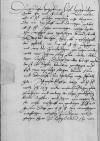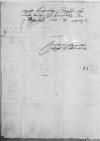Letter #4922
Ioannes DANTISCUS to Albrecht I von Hohenzollern-AnsbachFrauenburg (Frombork), 1538-09-02
| received 1538-09-08 Manuscript sources:
Auxiliary sources:
Prints:
| ||||||||
Text & apparatus & commentaryPlain textText & commentaryText & apparatus
 GStA, PK, HBA, C 1, No 517, f. 3 unnumbered
GStA, PK, HBA, C 1, No 517, f. 3 unnumbered
Dem durchlauchten, hochgebornen fursten und herrn, herrn
 GStA, PK, HBA, C 1, No 517, f. 1 unnumbered
GStA, PK, HBA, C 1, No 517, f. 1 unnumbered
Durchlauchter, hochgeborner furst, / hochgunstiger, lyber her und freundt. /
Wir wollen E(wer) F(urstlichen) D(urchlauch)t guther meynung nicht bergenn, / das wir  GStA, PK, HBA, C 1, No 517, f. 2 unnumbered altzeytt bereÿtwillig.
GStA, PK, HBA, C 1, No 517, f. 2 unnumbered altzeytt bereÿtwillig.
Datum(m) beÿ unser kirchen(n) zur


